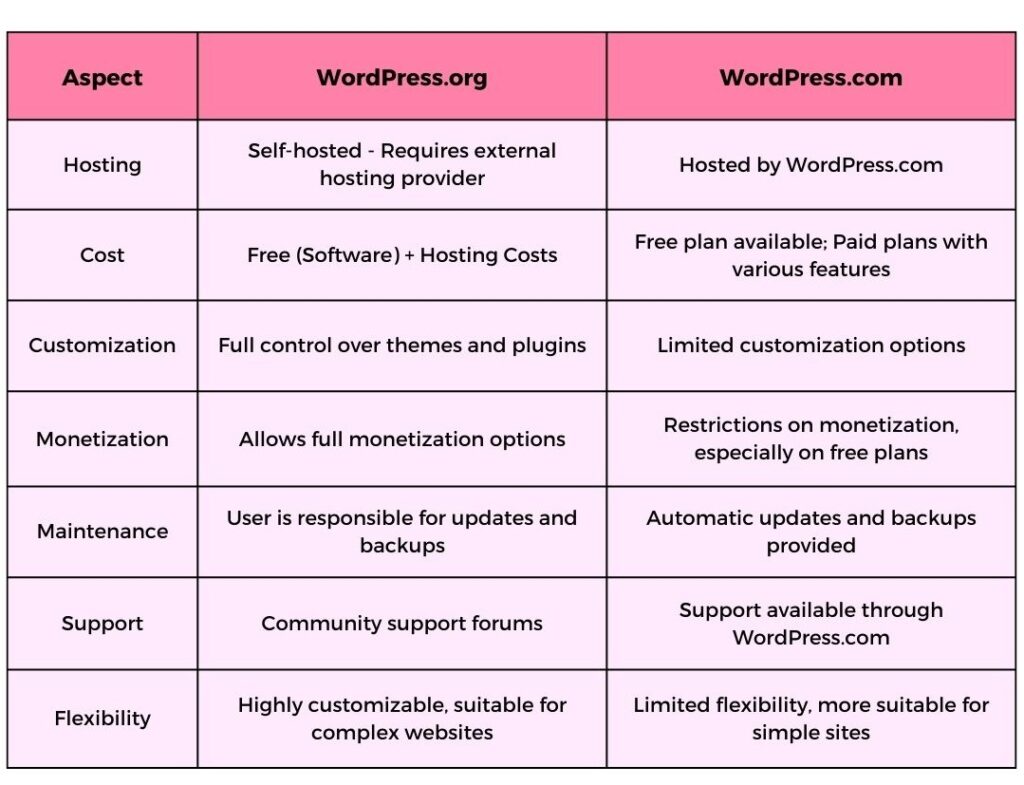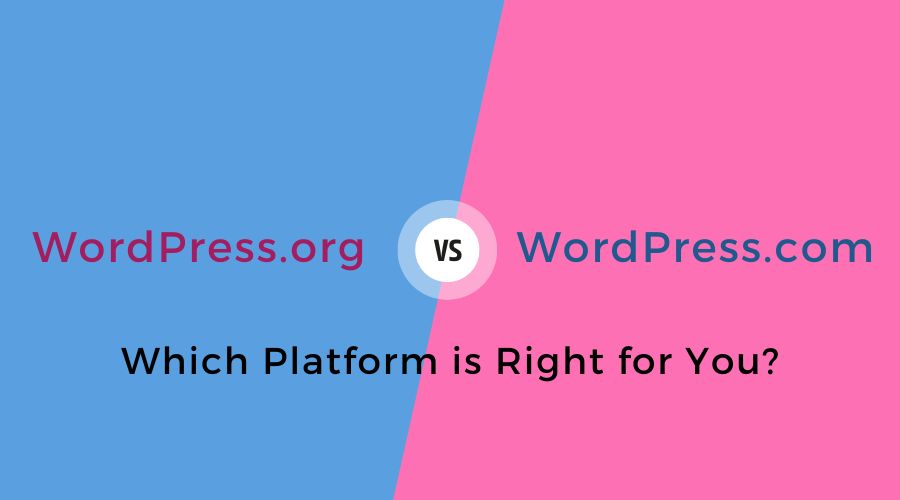Are you thinking about developing a website with WordPress but are confused which platform to use? You’re not alone! WordPress provides two main choices: WordPress.org and WordPress.com. Understanding the differences between them is critical in choosing the best decision for your website’s requirements. We’ll explore the differences between WordPress.org vs WordPress.com in this tutorial to help you decide which platform best suits your needs and preferences. Whether you’re a newbie looking for simplicity or an experienced developer seeking for customization, we’ve got you covered. Let’s get started and find out which WordPress platform is best for you!
Table of Contents
Brief overview of WordPress.org and WordPress.com
WordPress.org is an open-source platform that allows users to download and host WordPress on their own servers. It provides complete customizability, access to a large library of plugins and themes, and the opportunity to monetize websites.
WordPress.com, on the other hand, is a hosted platform that allows users to create websites that are hosted by WordPress.com. It has a simpler setup process, but less customization choices than WordPress.org. Users can chose from a variety of themes and plugins, with varying degrees of customization based on their plan.
Ownership and Control
WordPress.org: This is similar to owning your own home. You have to find a plot of land (hosting) and construct your home (website) from scratch. You have full control over everything, from the design (themes) to the functionality (plugins). You’re in charge of maintenance, security, and backups.
WordPress.com: Consider this similar to renting an apartment. Automattic (the company that is behind WordPress.com) offers the space (hosting) for your site. While you can design your flat (with themes), your options are restricted when compared to buying a home. You have less influence over the inner workings of your website and must follow the regulations established by Automattic.
Customization Options
WordPress.org: When you use WordPress.org, you have complete control over how your website appears and operates. You can modify the style of your site by selecting one of thousands of free or premium themes. You can also install plugins to bring new features or functionality to your website. This level of customization allows you to match your website to your exact requirements and preferences.
WordPress.com: Your customization possibilities on WordPress.com are more limited, particularly depending on the package you select. While you can still use a range of themes, you may not be able to fully customise them or utilise specific premium themes available on WordPress.org. Similarly, you may only be able to install a limited number of plugins depending on your plan. This implies you have less customization options than WordPress.org.
Cost Comparison
WordPress.org: Hosting and Domain Costs
- You have to pay for hosting and a domain name when using WordPress.org.
- Hosting is the process of renting internet space to keep your website’s files. Depending on the hosting company and the functionality you require, costs may change.
- Domain: This is the address of your website, such as www.yourwebsite.com. Every year, you must buy and renew a domain name; the cost can range from a few dollars to several thousand dollars, depending on the domain extension (.com,.org,.net, etc.).
WordPress.com: Free and Paid Plans with Various Features
- WordPress.com provides free and premium options.
- The free plan includes basic functionality, a subdomain (e.g., yourwebsite.wordpress.com), and minimal customization possibilities. Suitable for personal blogs or small projects.
- Paid plans provide additional features like as custom domain names, access to premium themes and plugins, greater customization options, and more support. The costs vary based on the package you select, ranging from a few dollars per month to more for business-level programms.
Monetization Opportunities
There are multiple ways to monetize your website with WordPress.org. You have complete control over your site, so you can display advertisements, sell things, provide services, or even create membership plans.
On the other hand, WordPress.com, particularly on its free plans, offers few ways to make money. Third-party adverts, product sales, and some monetization strategies are not permitted. You may need to upgrade to a subscription plan to gain access to more monetization capabilities and flexibility.
Maintenance and Support
WordPress.org:
- Updates: When using WordPress.org, it is your responsibility to keep your website up to date. This includes updating both the WordPress platform and any installed themes and plugins. These upgrades are critical for keeping your site secure and functional.
- Backups: Make sure to back up your website on a regular basis. Backups are backups of your website’s data and files that can be used to restore the site if something goes wrong, such as a hack or unintentional data loss.
- Security: It is your responsibility to install security measures to protect your website from potential risks such as hackers and malware. This may include installing security plugins, employing strong passwords, and adhering to website security best practices.
WordPress.com:
- Managed Platform: WordPress.com hosts your website on their servers and handles all of the technical parts of hosting a website. You don’t need to worry about updating WordPress themes, plugins, or software because this takes care of everything for you.
- Built-in Maintenance: To keep your website operating smoothly and effectively, WordPress.com takes care of regular maintenance activities like server optimization and performance monitoring.
- Support: If you have any problems or inquiries regarding utilising WordPress.com, their support team is available to assist you. You can contact their support team for assistance with technical issues, customization choices, or any other concerns you may have while using WordPress.com.
SEO and Analytics
You may easily select and install plugins from WordPress.org to improve the statistics and search engine optimization (SEO) of your website. This implies that you may measure visitor information and optimize your website for increased search visibility using tools like Yoast SEO or Google Analytics.
WordPress.com, on the other hand, has limited SEO and analytics features, particularly on lower-tier services. You may have access to basic features for optimising your site and tracking visitor statistics, but you will not have the same level of flexibility and control as WordPress.org, where you may select from a large choice of plugins to match your individual needs.
Community and Resources
WordPress.org:
- Huge Community: If you have any questions or require guidance, you can get assistance from the large community of users and developers.
- Comprehensive Documentation: You can find lots of tutorials and guidelines to help you learn how to use WordPress and solve typical issues.
- Forums: You can participate in online discussion groups where users exchange answers to problems they’ve experienced and discuss matters related to WordPress.
WordPress.com:
- Support from Automattic: Users who have inquiries or require assistance with their WordPress.com websites can get in touch with Automattic, the company that created WordPress.com.
- Limited Community Resources: While Automattic offers direct support, there are fewer supplementary resources, like as forums and substantial documentation, compared to WordPress.org.
Key Differences between WordPress.org and WordPress.com

